
Are you fed up with not ranking well on Google? I don’t blame you – after all, a higher rank on Google leads to more traffic to your website, higher return on investment (ROI) and, of course, more sales.
When clients start working with us, they say things like ‘We were on Google’s results page one for a while then we disappeared’ or ‘We just don’t understand SEO.’
In this article, we want to give you a simple power boost to help you generate more powerful results from SEO using semantic keywords
Table of contents:
- Discover the power of semantic keywords to drive your pages to the top of Google.
- What are Semantic Keywords in SEO?
- How do I find the perfect semantic keywords for my content?
- OK, I’ve got great semantic keywords, how do I use them?
- Use semantic keywords in your content naturally and strategically.
- For extra power, use semantic keywords in your headlines and subheadings.
- Create content that answers common questions related to your main keyword.
- SEO is a battle you can win with experts on your side.
What are Semantic Keywords in SEO?
Semantic keywords are related words and phrases that are closely associated with the focus keyword or topic of a piece of content.
Treat semantic keywords and other parts of SEO as your survival guide for high engagement online – semantic keywords help search engines better understand the meaning and context of your content, which can lead to higher rankings in search results.
And who wouldn’t want to be the number one business in the search results for a specific search term?
For example: if ‘coffee’ is your main keyword, it would be accompanied by these semantic keywords:
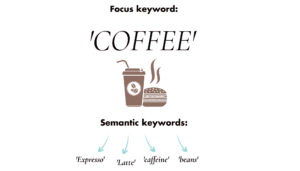
Any dark chocolate lovers here? Here is a great example of semantic keywords in play in this article on the topic of ‘7 Proven Health Benefits of Dark Chocolate.’
(If you are not a dark chocolate lover hopefully I can persuade you to become one through the various benefits it offers to your health)
The words marked in red are some semantic keywords which relate to the main keyword dark chocolate:
Kris Gunnars I healthline
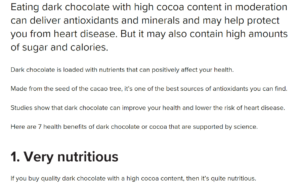
How do I find the perfect semantic keywords for my content?
There are several tools and techniques you can use to find semantic keywords for your content. One of the most popular is Google’s autocomplete feature, which suggests related search queries as you type into the search bar. This can give you a good starting point for identifying relevant semantic keywords.
Another option is to use keyword research tools such as Ahrefs or SEMrush, which provide data on related keywords, search volume, and competition level.
They can help to improve the relevance and the ranking potential of your content.
I like using SEMrush, as it provides our company with in-depth keyword data we can then use to help better reach our target audience. Before using these tools, it may be helpful for you to research their key differences and benefits.


OK, I’ve got great semantic keywords, how do I use them?
Once you have identified relevant semantic keywords, it’s time to use them to create smarter, more targeted content. Here are some tips to get you started:
Use semantic keywords in your content naturally and strategically.
Choose quality over quantity: when first starting with semantic keywords, you may be thinking to yourself, the more keywords I include, the better and Google will rank my page higher.
This is dangerous thinking – using too many keywords may be perceived as spam by Google and may even hurt your rankings.
After all, would you like to read a piece of content which includes semantic keywords in every sentence? It would get repetitive and you would probably get bored very quickly…
Instead, use semantic keywords in a natural, conversational way that adds value to your content and helps search engines understand its context. A good piece of content online pleases both the reader and Google.
For extra power, use semantic keywords in your headlines and subheadings.
Your main keyword should be in your headline and ideally in some of your subheadings. But did you know this should also be the case for semantic keywords?
Headlines and subheadings are some of the most important elements of your content, both for readers and search engines.
These two elements are crucial to master in your content for 1 important reason:
When a user first clicks on your article, they will engage in this action called a blink test. This is only 3-5 seconds a website visitor uses to quickly scan and judge your content to determine if they want to stay on your page.
So you must make it visually presentable and engaging or else your readers may leave fast. A really good way to grab attention is to use power words to maximise the emotional pull of your content.
By including relevant semantic keywords in your headlines and subheadings, you can signal to search engines the main topics and themes of your content, and help readers quickly identify the most important information.
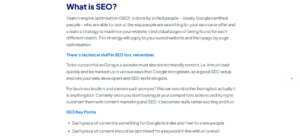
Create content that answers common questions related to your main keyword.
As mentioned earlier, online forums and Q&A sites can be great resources for identifying common questions and topics related to your main keyword.
If you are struggling to think of an effective title for your article, I would highly recommend trying out answerthepublic.com This is a great tool as it gives you an insight into the type of questions people are asking Google around a topic.
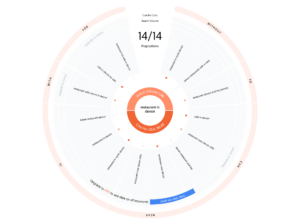
People are also more likely to find the content they are looking for from your site if you use semantic keywords in your meta descriptions and URLs. Meta descriptions and URLs are important elements of your content that are often overlooked. If we refer back to the dark chocolate example,
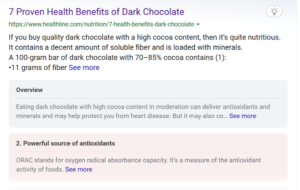
Kris Gunnars I healthline
In today’s digital landscape, semantic keywords are an essential component of any successful SEO strategy. By following the tips I outlined above, you can create smarter, more targeted content that meets the needs of your target audience and drives traffic to your website.
SEO is a battle you can win with experts on your side.
Our team are all certified Google experts and more importantly are friendly and approachable experts who enjoy sharing their skills to build your knowledge. If you’d like to ask them anything or request a report on the digital landscape around your business, please get in touch.




